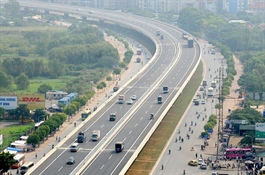World Bank forecasts growth of 4.7 per cent in 2023
World Bank forecasts growth of 4.7 per cent in 2023
According to the latest report by the World Bank, Vietnam’s economy is expected to grow by 4.7 per cent in 2023, with a slow recovery to 5.5 per cent in 2024 and 6 per cent in 2025.

After registering 8 per cent real GDP growth in 2022, Vietnam’s economic growth decelerated sharply in the first half of 2023, reflecting a global slump and weaker domestic demand.
The nation's real GDP growth slowed to 3.7 per cent on-year during the first half of 2023, well below that posted a year earlier (6.4 per cent).
Dorsati Madani, senior economist at World Bank Vietnam said, "The slowdown was triggered by a sharp deterioration in external demand, with exports contracting by 12 per cent on-year in the first half of 2023. This in turn weighed on the performance of the export sector, which is estimated to account for half of Vietnam’s GDP."
Simultaneously, domestic demand moderated due to the fading base effects of last year’s post-COVID rebound and weakening consumer confidence. Growth in final consumption expenditure slowed to 2.7 per cent on-year, compared with 6.1 per cent in the first half of 2022.
Despite resilient foreign direct investment (FDI) and a slight pick-up in public backing, the total growth in this area also declined, driven by weak private domestic investment, which slowed substantially to 2.4 per cent on-year from 11.8 per cent during the same period last year.
Amidst decreasing inflationary pressures and slowing growth, the State Bank of Vietnam has loosened its monetary policy to buttress the economy. It reduced discount and refinancing rates by a cumulative 150-200 basis points through a series of four policy rate cuts between March and June – to 3 per cent and 4.5 per cent respectively.
Despite these cuts, credit growth slowed from 16.8 per cent on-year in June 2022 to 7.8 per cent in the same month this year, reflecting weaker demand from businesses.
According to the report, the outlook for Vietnam's economy is subject to heightened domestic and international risks. Slower-than-expected growth in advanced economies could further dampen external demand for Vietnam’s export sector.
Continued uncertainties in the global financial market have the potential to rekindle stress in the global banking sector, intensify investor risk aversion, and discourage investment – including FDI to Vietnam.
Additional monetary policy tightening in major advanced economies to combat persistent inflation could widen the interest rate gap between international and domestic markets, which could exert additional exchange rate pressures on the local currency.
The report stated, "As growth has slowed sharply, active fiscal policy support is warranted. A full implementation of the planned investment budget would bring public investments to 7.1 per cent of GDP in 2023, up from the 5.5 per cent planned in 2022, providing 0.4 per cent of GDP in fiscal impulse to support aggregate demand."
Fiscal policy can also help enhance the sustainability of Vietnam’s economic growth. For instance, investing in human capital and skills helps to improve productivity and drives the economy. It can aid in the building of resilience to climate change by prioritising greener production and consumption.
Furthermore, implementing carbon taxation and other fiscal instruments incentivises industries to reduce their carbon footprint and adopt more sustainable practices.



























